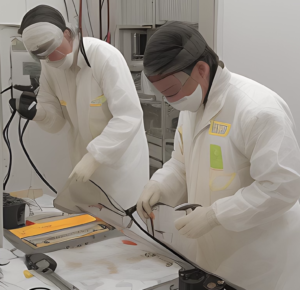Hotels are bustling hubs of activity, hosting guests from all walks of life. From luxurious suites to cozy retreats, these establishments aim to provide comfort, convenience, and, above all, safety. However, behind the scenes, there are numerous electrical systems and equipment that power the guest experience. To ensure the safety and efficiency of these systems, dielectric testing is indispensable. In this article, we delve into three crucial reasons why dielectric testing is imperative for hotels.
Ensuring Guest Safety
Guest safety is paramount in any hotel. Electrical malfunctions pose significant risks, including fire hazards and electrical shocks. Dielectric testing helps identify potential weaknesses in electrical insulation, which could lead to such hazards. By subjecting electrical systems and equipment to dielectric testing, hotels can detect insulation breakdowns or weaknesses before they escalate into dangerous situations. This proactive approach not only safeguards guests but also protects the hotel’s reputation and minimizes liability risks.
Preventing Fire Hazards: Electrical fires are a severe threat to hotel safety. Faulty wiring, overloaded circuits, or damaged insulation can all contribute to the risk of fire outbreaks. Dielectric testing assesses the integrity of insulation materials, ensuring they can withstand the voltage levels they’re subjected to. By identifying and addressing insulation weaknesses promptly, hotels can mitigate the risk of electrical fires, thereby enhancing guest safety and preserving property integrity.
Mitigating Electrical Shock Risks: Electrical shocks can occur due to various factors, including exposed wiring, faulty equipment, or inadequate insulation. Dielectric testing helps pinpoint potential areas of concern within electrical systems, reducing the likelihood of electrical shocks to guests or staff. By maintaining robust insulation integrity, hotels demonstrate their commitment to safety, fostering trust and confidence among their patrons.
Enhancing Operational Efficiency
Efficiency is key to the smooth operation of any hotel. Electrical failures or downtime can disrupt guest services, leading to inconvenience and potential revenue loss. Dielectric testing plays a vital role in maintaining the reliability and efficiency of electrical systems, thereby ensuring uninterrupted operations and guest satisfaction.
Identifying Maintenance Needs: Regular dielectric testing provides insights into the condition of electrical components, enabling proactive maintenance measures. By detecting issues early on, hotels can schedule repairs or replacements during off-peak periods, minimizing disruptions to guest services. This predictive maintenance approach maximizes operational efficiency and prolongs the lifespan of electrical assets, ultimately reducing long-term maintenance costs.
Compliance with Regulatory Standards: Hotels are subject to various regulatory requirements concerning electrical safety. Compliance with these standards is not only a legal obligation but also essential for maintaining operational licenses and certifications. Dielectric testing ensures that hotels meet or exceed the required safety standards, demonstrating their commitment to regulatory compliance and guest welfare. By staying ahead of regulatory requirements, hotels can avoid penalties and uphold their reputation as safe and reliable establishments.
Safeguarding Reputation and Guest Experience
A hotel’s reputation is built on its ability to provide exceptional service and ensure guest satisfaction. Electrical failures or safety incidents can tarnish this reputation, leading to negative reviews and loss of business. Dielectric testing serves as a proactive measure to safeguard the hotel’s reputation and enhance the overall guest experience.
Upholding Brand Integrity: Guests expect hotels to prioritize their safety and well-being. By investing in regular dielectric testing, hotels demonstrate their commitment to maintaining high safety standards and protecting guest interests. This proactive approach not only safeguards the hotel’s brand integrity but also fosters loyalty among guests who value safety and reliability.
Minimizing Disruptions: Electrical failures can disrupt guest services, causing inconvenience and dissatisfaction. By ensuring the reliability of electrical systems through dielectric testing, hotels minimize the risk of service interruptions and ensure a seamless guest experience. Whether it’s powering essential amenities or maintaining climate control systems, reliable electricity is fundamental to guest comfort and satisfaction.
Conclusion
In conclusion, dielectric testing is indispensable for hotels seeking to prioritize safety, enhance operational efficiency, and safeguard their reputation. By proactively assessing the integrity of electrical insulation, hotels can mitigate fire hazards, reduce the risk of electrical shocks, and ensure uninterrupted operations. Moreover, dielectric testing demonstrates a commitment to regulatory compliance and guest welfare, thereby fostering trust and loyalty among patrons. As hotels continue to prioritize guest safety and satisfaction, integrating dielectric testing into their maintenance practices is essential for long-term success in the hospitality industry.


